 Petzlover
Petzlover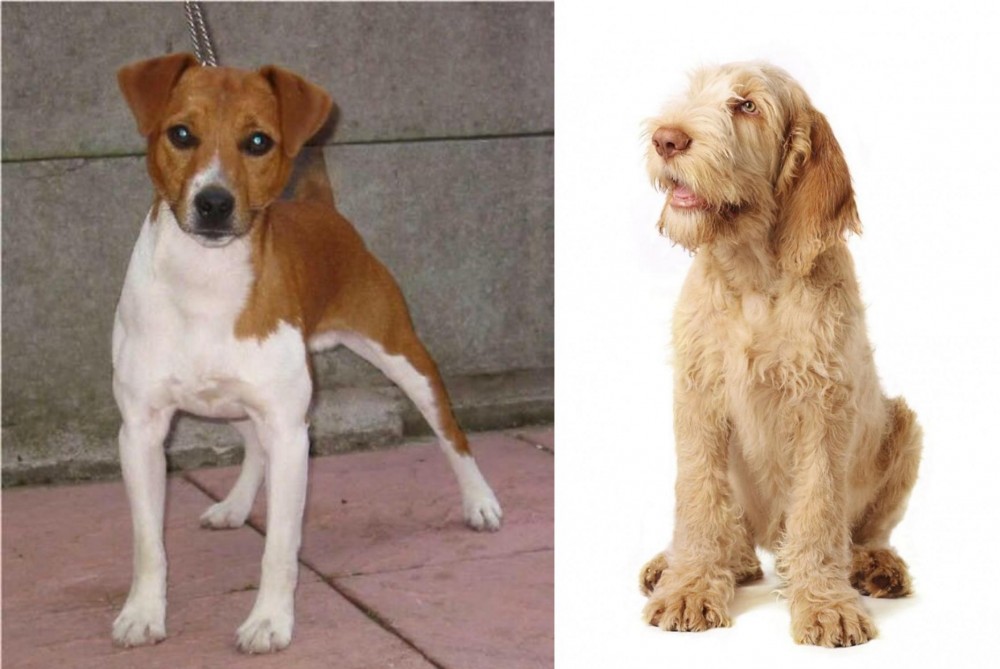 Plummer Terrier is originated from United Kingdom but Spinone Italiano is originated from Italy. Plummer Terrier may grow 34 cm / 13 inches shorter than Spinone Italiano. Plummer Terrier may weigh 31 kg / 68 pounds lesser than Spinone Italiano. Plummer Terrier may live 6 years more than Spinone Italiano. Plummer Terrier may have less litter size than Spinone Italiano. Plummer Terrier requires Low Maintenance. But Spinone Italiano requires Moderate Maintenance
Plummer Terrier is originated from United Kingdom but Spinone Italiano is originated from Italy. Plummer Terrier may grow 34 cm / 13 inches shorter than Spinone Italiano. Plummer Terrier may weigh 31 kg / 68 pounds lesser than Spinone Italiano. Plummer Terrier may live 6 years more than Spinone Italiano. Plummer Terrier may have less litter size than Spinone Italiano. Plummer Terrier requires Low Maintenance. But Spinone Italiano requires Moderate Maintenance
 This purebred dog was developed by Dr David Brian Plummer in the UK. The whole idea for developing the dog was for it to be an all-purpose dog that could also hunt down vermin.
This purebred dog was developed by Dr David Brian Plummer in the UK. The whole idea for developing the dog was for it to be an all-purpose dog that could also hunt down vermin.
Developed in the 1960s, the Plummer Terrier combines Jack Russell Terrier, Beagle, and red Fell Terrier blood. Later on, a Bull Terrier was brought in too. This created some problems and certain characteristics were selectively bred out of the Plummer.
Today, as a working terrier, the dog is versatile and has many uses. He may not be recognized by any major organizations, but there is at least a well-established Plummer Terrier club in the UK.
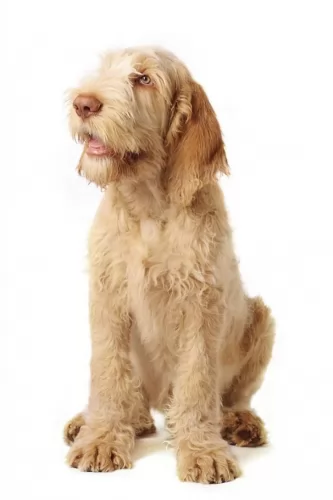 This Italian breed has an ancient blood line tracing all the back to 500 BC. Originally bred to hunt, he is today a friendly, alert and loyal companion. He is intelligent enough to do any job you give him. The Spinone is thought to be one of the oldest gun dogs ever, but it is not entirely clear that he came from Italy. There are some who think he may have come from somewhere in these European countries – Italy, Greece, France, Celtic Ireland, Spain or Russia. However, most believe the breed came from Italy in the Piedmont area.
This Italian breed has an ancient blood line tracing all the back to 500 BC. Originally bred to hunt, he is today a friendly, alert and loyal companion. He is intelligent enough to do any job you give him. The Spinone is thought to be one of the oldest gun dogs ever, but it is not entirely clear that he came from Italy. There are some who think he may have come from somewhere in these European countries – Italy, Greece, France, Celtic Ireland, Spain or Russia. However, most believe the breed came from Italy in the Piedmont area.
The most common thinking is that he is a descendent of the Spanish Pointer and/or the Russian Setter. One other theory is that setters from Greece were brought to the Roman Empire and crossed with a variety of Italian dog to make the coarse haired Spinone we see today. Then the French put in their claim that the breed is a cross of many French pointers.
The theory that counts might just belong to the Italians who believe the ancestor to the Spinone includes the German Wirehaired Pointer, the Pudelpointer and the Wirehaired Pointer. It was not until the 19th century that the name Spinone was officially given to the breed.
Before that it might have been known as a Spinoso and named after a thorn bus in Italy called the Spino. This bush was so thick and sharp that small prey animals learned to hide under it because the predators could not get through it. The Spinone however was able to fight through the briars with its thick, coarse hair and tough skin.
The breed almost became extinct during the second world war as before and after the hunters in Italy had started to use other breeds for hunting. Breeders also began to cross the Spinone with wire hairs like German Wirehaired Pointer, the Wirehaired Pointing Griffon and the Boulet.
The most popular hunting dog in Italy today is the Bracco Italiano while the Spinone is still used for hunting.
 The Plummer Terrier is a small, working terrier standing at between 28 and 36cm both male and female and weighing between 5 and 8kg.
The Plummer Terrier is a small, working terrier standing at between 28 and 36cm both male and female and weighing between 5 and 8kg.
The ears of the dog are high set and are fairly short, being floppy. The Plummer Terrier has a white and red/orangey coat which is short. He is an average shedder.
The tail would traditionally be docked, giving him an attractive, compact look, but these days the tail tends to be left long. The eyes are almond-shaped, dark brown and alert.
Your Plummer Terrier is active, hardy and adaptable, making it that he can settle down into life in the city or in the countryside. They will however, require regular exercise.
They’re the kind of dogs which are at home inside or outside. They’re very intelligent and can easily be trained and socialized. They’re also loving and loyal towards their human family. He is good with kids too and is playful and energetic around them, giving as good as he gets. His alert, intelligent nature makes him a good watchdog.
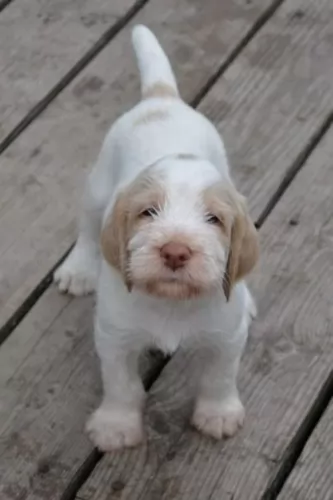 The breed is made up of strong, solid and muscled dogs that have an almost square build. His legs are made to travel any terrain and his head is long with an occipital that is pronounced and unique to the Spinone. They are said to have “human appearing eyes”, with a docked tail in countries allowing it and webbed paws.
The breed is made up of strong, solid and muscled dogs that have an almost square build. His legs are made to travel any terrain and his head is long with an occipital that is pronounced and unique to the Spinone. They are said to have “human appearing eyes”, with a docked tail in countries allowing it and webbed paws.
Shorter hair covers their feet, head, legs, muzzle and ears. They have longer hair on their eyebrows and it is stiff, with soft hair on the muzzle and cheeks with a beard and mustache. It is a single coated dog though the coat is rough. They should have skin, lips, nose, and pads in colors that coordinate with their coats. For white dog it is a red-orange color, brown in dogs that are roan colored and dark red-orange in the orange and white colored dog.
 Your Plummer Terrier promises to be a great companion and family pet, getting on well with children.
Your Plummer Terrier promises to be a great companion and family pet, getting on well with children.
They’re intelligent too, so they’re easy to train. Being low maintenance and being a healthy breed too, the Plummer Terrier has got everything that people want from a canine friend - love, devotion, action, low maintenance, health and a wonderfully companionable nature.
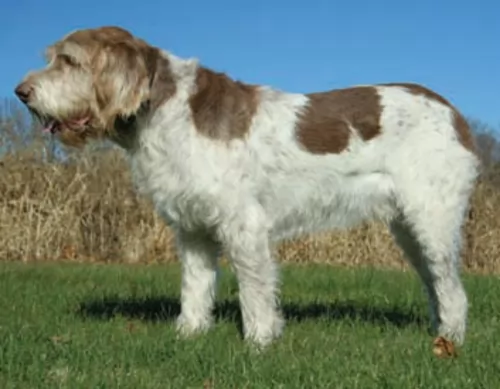 3.Adaptability – Young dogs need a lot of attention but they don’t need a lot of space. The young dogs are energetic while the adult dogs are laid-back. They need exercise every day and at least a small back yard.
3.Adaptability – Young dogs need a lot of attention but they don’t need a lot of space. The young dogs are energetic while the adult dogs are laid-back. They need exercise every day and at least a small back yard.
 These feisty little dogs are known to be a robust, healthy breed and with good care can reach between 12 and 15 years of age, and maybe older.
These feisty little dogs are known to be a robust, healthy breed and with good care can reach between 12 and 15 years of age, and maybe older.
Some common dog diseases that your Plummer Terrier might succumb too, but which is highly unlikely.
Distemper and parvovirus are two example of these infectious diseases. Parvovirus is deadly and can be picked up through contact with the feces of an infected dog. Your dog will be vomiting, won’t want to eat and will no doubt also have bloody diarrhea.
Distemper is transmitted through contact with an infected dog’s urine or blood. Symptoms include difficulty with breathing, fever and diarrhea. There are vaccines available for the prevention of these life-threatening diseases.
This disease can be debilitating for your pet and can include incontinence and bacterial infections. You’ll find your pet trying to urinate frequently but producing small drops of urine. Don’t hesitate – get your pet to the vet immediately.
You have to be careful with dental disease because many people think it affects just the teeth but it is linked to problems with the heart, kidneys and to diabetes. To prevent dental problems, look inside your dog’s mouth regularly and get him to a vet or professional dog groomer to attend to the tooth.
 This is an ancient breed with not a lot of documented genetic issues, but it does have one deadly condition.
This is an ancient breed with not a lot of documented genetic issues, but it does have one deadly condition.
• Cerebellar ataxia (CA) is inherited and hits the puppies. Because it is a recessive gene both the mother and father must carry it for the puppy to inherit it. This makes it less likely than it would be otherwise. Puppies with the condition do not live more than a year. Since it is a genetic problem there is now a test for it that identifies carriers at a 95% accuracy rate.
• Like many other large breed dogs, they are susceptible to hip dysplasia. This can cause arthritis and/or lameness. There are now hip replacement surgeries available for this condition.
• Bloat is again common in large dogs and you need to watch for it with the Spinone. It can be deadly if not treated immediately. Let your dog rest quietly after eating. Do not let her exercise or play energetically after eating.
 He is an active, energetic little dog and loves nothing more than to be darting after a ball, going for long walks with you or jumping into a pool. He’s happiest when active and busy with his beloved family members.
He is an active, energetic little dog and loves nothing more than to be darting after a ball, going for long walks with you or jumping into a pool. He’s happiest when active and busy with his beloved family members.
With his short coat and being a moderate shedder, you’ll just have to give your Plummer a good brush twice a week to keep the coat free of loose hairs and dust.
Always aim to give your dogs the best food there is. Dogs are just like people when it comes to food – nutritious, quality food helps towards good health and longevity. Apart from a good quality commercially manufactured food, give him some homemade food as a treat too. Simple, tasty food is best appreciated by dogs. They don’t want spicy, exotic foods that can upset their stomachs.
They love boiled chicken, brown rice or pasta and healthy vegetables such as sweet potatoes, carrots and spinach. You can add this into the dry kibble occasionally as a treat, and also some raw meat from time to time. Your pet will be healthy and happy with such a diet. Make sure he always has a bowl of cool, fresh water within reach.
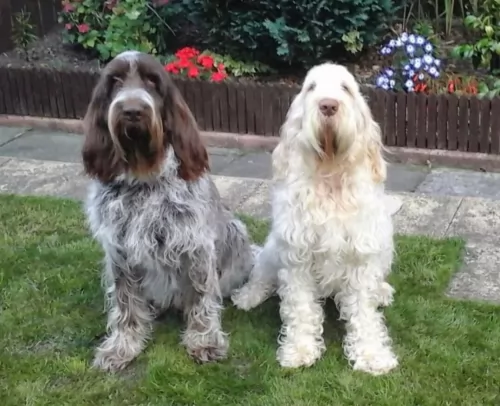 1Feeding the puppy – feed a high quality dog food for puppies of large breeds. Feed 3-4x day but don’t overfeed or let him exercise after eating even as a puppy.
1Feeding the puppy – feed a high quality dog food for puppies of large breeds. Feed 3-4x day but don’t overfeed or let him exercise after eating even as a puppy.
2.Feeding the adult - feed a high quality dog food for large breeds. Feed 1-2X day but don’t overfeed or let him exercise after eating.
4. Games and Exercises – The Spinone is an active breed, but not a fast dog. In fact, they like to travel at a trot so it becomes a great dog for jogging or running with. They love to jump, track, hunt, hike. They do well with agility, retrieving, flyball, carting, being a therapy dog, a rescue dog and a watchdog.